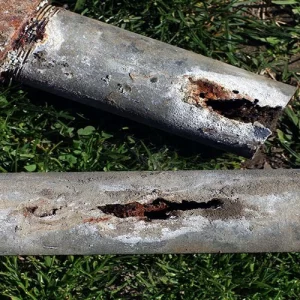Overheating in boiler tubes occurs when the temperature of the tubes increases beyond the recommended operating temperature for an extended period of time. This can be caused by several factors, including poor combustion, insufficient cooling, inadequate water treatment, or other operational problems. When boiler tubes overheat, their material strength can decrease, leading to deformation, cracking, and eventual failure.
Two main types of overheating can occur in boiler tubes:
1. Short-term
2. Long-term overheating
A) Short-Term Overheating
Occurrence
It occurs when the temperature of the tube exceeds the recommended operating temperature for a short period, typically due to a sudden increase in heat input or a decrease in cooling flow.
Results
This type of overheating can result in the following issues:
1. Thin-Lipped, Longitudinal Rupture:
This occurs when localized overheating causes a weakened area of the tube to rupture along its length, resulting in a thin-lipped, longitudinal rupture. This type of rupture can be caused by issues such as flame impingement, overheated refractory, or blocked cooling water.

2. Extensive Tube Bulging:
This occurs when localized overheating causes the tube to expand beyond its normal diameter, resulting in extensive tube bulging. This type of bulging can be caused by issues such as restricted water flow, inadequate cooling, or flame impingement.

3. Large Fish-Mouth Appearance:
This occurs when the tube end opens up like a fish’s mouth due to pressure build-up caused by localized overheating. This type of appearance can be caused by issues such as blocked cooling water, insufficient water flow, or overheated refractory.

Causes
There can be several typical causes of short-term overheating in boiler tubes, including:
1. Flame Impingement:
This occurs when the flame comes in direct contact with the tube surface, causing localized overheating and potential damage.
2. Blocked Cooling Water:
This can occur when the cooling water is blocked or restricted, reducing the cooling effectiveness and causing localized overheating.
3. Inadequate Cooling:
This can be caused by issues such as low cooling water flow or insufficient cooling water velocity, resulting in localized overheating.
4. Overheated Refractory:
This can occur when the refractory material surrounding the boiler tubes becomes overheated, causing localized overheating and potential damage to the tubes.
5. Fouling or Scaling:
This occurs when deposits such as mineral scale or corrosion products build up on the tube surface, reducing heat transfer and potentially causing localized overheating.
B) Long Term Overheating
Occurrence
Long-term overheating occurs when the temperature of the tube is consistently higher than the recommended operating temperature over an extended period.
Results
This type of overheating can result in the following issues:
1. Little to Moderate Bulging:
Long-term overheating can cause gradual deformation of the tube, resulting in little to moderate bulging. This can occur due to factors such as inadequate cooling, high-temperature gradients, or insufficient tube wall thickness.

2. Little to Moderate Reduction in Wall Thickness:
Long-term overheating can also cause a gradual reduction in the thickness of the tube wall due to thermal degradation. This can occur due to factors such as exposure to high temperatures or corrosive gases.

3. Typically accompanied by thermal oxidation:
Long-term overheating can lead to thermal oxidation, a chemical reaction that occurs when metal is exposed to high temperatures and oxygen. This can cause further degradation of the tube material and increase the risk of failure.

4. Found in Superheaters, Reheaters, Waterwalls:
Long-term overheating is typically found in components such as superheaters, reheaters, and waterwalls, which are exposed to high temperatures and pressures over long periods of time. These components are crucial for efficient boiler operation, and their failure can lead to costly downtime and repairs.

Causes
There can be several typical causes of short-term overheating in boiler tubes, including:
1. Insufficient Cooling:
This can occur due to factors such as low cooling water flow rate, high water velocity, or inadequate cooling surface area. Over time, this can lead to a gradual increase in tube wall temperature and degradation of the tube material.
2. Inadequate Tube Wall Thickness:
Tubes with insufficient wall thickness are more susceptible to long-term overheating due to their reduced ability to dissipate heat. This can occur due to factors such as inadequate design, corrosion, or erosion.
3. High Temperature Gradients:
Large temperature differences between the tube wall and the surrounding fluid can cause thermal stresses that lead to long-term overheating. This can occur due to factors such as uneven heat distribution or changes in operating conditions.
4. Corrosive Gases:
Exposure to corrosive gases such as sulfur dioxide, hydrogen sulfide, or chlorine can lead to gradual degradation of the tube material over time, increasing the risk of long-term overheating.
5. Design Issues:
Poor design or inadequate materials selection can lead to long-term overheating in boiler tubes. This can occur due to factors such as inadequate consideration of temperature and pressure conditions, or improper material selection.
Conclusion
In conclusion, preventing boiler tube failures caused by overheating is crucial for ensuring safe and efficient boiler operation. It requires identifying and addressing the various causes of short-term and long-term overheating. As a leading provider of innovative and high-quality boiler solutions, Solarkaz International understands the importance of proactive maintenance and monitoring to prevent overheating and tube failures. By implementing best practices and leveraging the latest technologies, Solarkaz International helps its clients minimize downtime, increase reliability, and extend the lifespan of their boiler systems.

